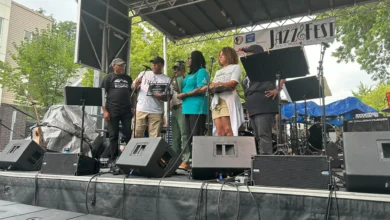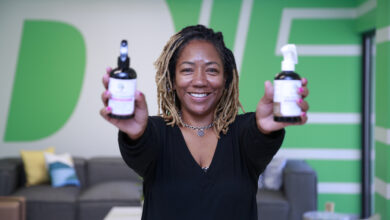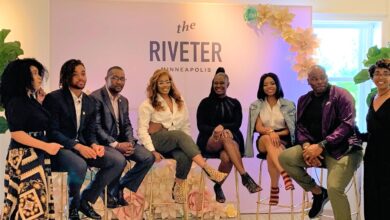Minuteman Press: Growing printing business is primed for growth


Printing business is primed for growth
Just west of Interstate 94 in North Minneapolis sits a 30,000-square-foot building owned by Frank Brown. The building houses a Minuteman printing franchise, which was previously located in Uptown. Brown relocated the business to the Washington Avenue site a year and a half ago.
The veteran printer supports business owners who share his values of diversity in the workforce, something not seen during the decades he spent working for large companies. “You go into these other printing companies, number one, you ain’t gonna see none of us in management,” he explains.
“There may be exceptions, but generally speaking, you’re only going to see us [working] on the floor.” His management team comprises a Filipino VP of sales, a Native American operations manager, and an African lead graphic designer.
The company’s previous owners had been buying their paper from a St. Paul company. When Brown saw no diversity in their staff, he asked to talk with the owner to see if it was something he could change.
“They gave me the run-around, so I pulled all of my paper business out of there,” moving it to a company in Fridley. “There’s no Black-owned paper companies [in Minnesota],” he says. “But if it ain’t owned by us, you better at least be hiring us from the community.”
– ADVERTISEMENT –
Brown started in the printing business in 1988 as an accounting clerk. Working at a Seattle, Washington, company allowed him to pay for college and obtain an MBA. He left when he found that there were limited opportunities for advancement for people of color.
He landed a job in Albert Lea, Minnesota, with a company printing pull tabs. He eventually moved to the Twin Cities following the sale of that company. He was an organizer for Take Action Minnesota and became active with the DFL party. He helped push ban-the-box legislation, allowing felons to be considered for a job instead of being quickly weeded out by checking a box.
After a couple of years, he returned to printing for RR Donnelley, but his activism background only allowed him to stay at the job for a few years. “They had a woman there that had been there for about 25 years, and she was training all of these men on how to run their presses,” he says. “They were paying the men more than they were paying her, which didn’t fit my values.”
People of color were mainly limited to their assembly area. “A warehouse supervisor walks up to me, and she says, ‘You need to get your monkeys working.’” Though she was reprimanded for the comment, it was just the push Brown needed to go into business for himself.
After buying a Minute Man franchise, he joined the union. “When I first started, I looked at the union contract, and the lowest wage was eight bucks an hour,” he explains. “I said, I’m not going to pay anybody that low.” He changed his minimum wage to $12 an hour, raising it to $15 when he found it was a livable wage.
– ADVERTISEMENT –
“I do hire people with [criminal] records if they qualify for the job,” he says. “Minnesota has the largest disparity in criminal justice. They’re arbitrarily giving people of color these criminal records, and so, as Black-owned businesses, we’ve got to help our people.”
A tour of the facility includes a small museum of printing relics, including an old paper cutter that looks like a guillotine and a machine used to mix ink manually. Compared with the high-tech machinery he currently uses, it’s easy to see how the printing process has advanced, allowing Brown incredible versatility.
They print signage, banners, postcards, bulk mailing, business cards, envelopes, menus, wallpaper, backlit signs, and print on canvas chairs. There are options to use eco-friendly materials that can be recycled after use. They have machines that print on virtually any surface, including metal and plastic. They print braille, textured photographs, and digital signs.
“We can make any kind of book,” he says, saddle stitched, plastic coil, wire bound, or softbound book, to name a few. They can wrap a bus, semi-truck, or van with signage or logos in their vehicle wrap area.
Though they print for many privately-owned companies, like overflow printing for Ecolab and Cargill, much of their work is for nonprofits, including Take Action Minnesota, Jewish Community Action, ISAIAH, Emerge, and Twin City Rise. He has faced challenges negotiating with big companies and is just making headway with Target, a relationship he has cultivated for years.
– ADVERTISEMENT –
But Brown says this is only the beginning. “We’re in kind of a growth stage,” he says. “Once we’re in a good position, I want to start working with the high schools and getting some intern
programs. I think [students from] North High and Patrick Henry…after walking around and seeing a high-tech printing facility, they’ll say, “This ain’t like the old ink and get-dirty kind of stuff.” Since most of the work is digital, he feels it will appeal to the type of work young people seek.
Unlike in Minnesota, Brown’s experience in Seattle was augmented by more solidarity among Black businesses. He talks about business owners’ role in their respective communities.
“As a business owner, I’m a leader in the community,” he says. “Any African American who owns a business is also a leader in their community, and we must ensure that we look out for the community.”
Minuteman Press is at 4024 Washington Ave. N., in Minneapolis. To contact them, call 612- 870-9008.
– ADVERTISEMENT –
Support Black local news
Help amplify Black voices by donating to the MSR. Your contribution enables critical coverage of issues affecting the community and empowers authentic storytelling.























































